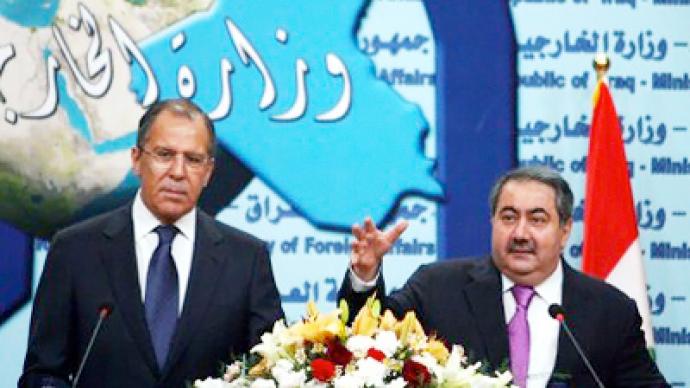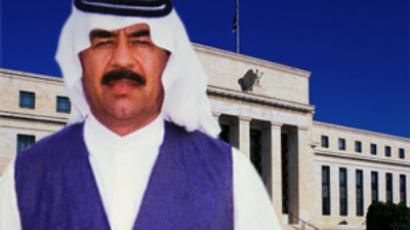Promising military-technical cooperation in Iraq, Lavrov pokes fun at WikiLeaks

Russian Foreign Minister Sergey Lavrov said on Tuesday that Russia is prepared to develop cooperation with Iraq in the military-technical realm, while adding that he hoped a message to the Iraqi prime minister would not be intercepted by WikiLeaks.
"We are ready to develop cooperation in other spheres, including the military-technical one," the foreign minister said at a news conference in Baghdad. Lavrov also said that during his visit, he would relay a message from the Russian president to the Iraqi prime minister. "Hopefully it will not find itself at WikiLeaks," Lavrov quipped to laughter.WikiLeaks, the whistle-blowing website that has been responsible for releasing thousands of pages of confidential documents and video into the public domain, began dumping some 260,000 cables from US embassies around the world in November (the cables were dated from December 28, 1966 to February 28, 2010).In April 2010, the non-profit organization posted a classified video of a US helicopter crew in Baghdad, Iraq, opening cannon fire at a group of nine men, including two Reuters employees, after the pilots apparently thought the men were carrying weapons, which were in fact cameras.The video attracted worldwide condemnation.WikiLeaks editor Julian Assange received the video, as well as the US cables, from 22-year-old American Army intelligence analyst Bradley Manning, who was arrested in May 2010. Manning said he decided to release the documents to show “how the first world exploits the third, in detail.”Meanwhile, Assange is free on bail until July when his case will be heard by the English courts to decide whether the former computer hacker-turned hactivist should be extradited to Sweden for questioning in relation to a sexual assault investigation.Assange has said the allegations of wrongdoing against him are "without basis.”Russia opposes outside interference in Middle East affairsForeign Minister Sergey Lavrov said during his working visit to Iraq, which was invaded on March 20, 2003 by a US-led coalition, that Moscow categorically opposes interference in the affairs of the Middle East states and the use of force in settling conflicts in the region.“Attempts to impose recipes of state or political set-up on states are unacceptable," Lavrov said at a press conference in Baghdad. "Russia wants problems facing the region to be tackled primarily by the countries of this region.”Lavrov added that trying to settle such disputes by using crude force, especially against civilians, “is unacceptable.”Today, yet another military operation is taking place, this one in Libya, where a coalition of NATO members, most notably Britain, France and the US, are working under a UN resolution to protect civilians from the ravages of a lengthy civil war between anti-government groups and loyalists to Libyan strongman Muammar Gaddafi.Russia, which abstained from voting on the resolution, has warned that the coalition is going beyond its UN mandate, taking sides in the conflict on the side of the anti-Gaddafi militants. This could have tremendous consequences, Moscow has warned in the past, because so little is known about the Libyan opposition. It has even been reported that members of al-Qaeda have infiltrated the ranks of the anti-government rebels, taking advantage of a tragic scenario for its own advantage. Details of Iraq-Russian cooperationIn an interview with Interfax, a Russian Foreign Ministry spokesman provided some details into the ways Moscow and Tehran will seek cooperation in the future."Ways to promote military-technological cooperation between our countries will be discussed,” said a member of the Foreign Ministry, who spoke on condition of anonymity. “The sides will also discuss measures to step up cooperation between all of the agencies involved, including the Interior Ministry, the Emergency Situations Ministry and others.”Meanwhile, efforts to bring the situation in Iraq back to normal will also rank high on the agenda."The upcoming discussions and talks should confirm both sides' commitment to broadening and deepening bilateral cooperation in key international and regional problems, as well as to further promoting their mutually beneficial partnership in different spheres based on decades-old traditions of friendly communication and close cooperation," the official said.Meanwhile, serious attention will be paid to the ongoing events gripping the countries of North Africa and the Middle East, as well as what impact the wave of uprisings will have on the Arab world's immediate future."In this context,” the Foreign Ministry spokesperson said, “the sides will exchange opinions on the situation in Libya, Syria, Yemen and other countries of the region from the point of view of the need to resolve these crises through exclusively peaceful methods, without violence against civilians and bearing in mind the unacceptability of imposing any decisions on these states from abroad.”On the Iraqi business frontSergey Lavrov seemed confident that Russian companies will regain their former presence in Iraq soon."I don't think it will take too much time to regain and even surpass the previous level," Lavrov told reporters in Baghdad on Tuesday after talks with his Iraqi counterpart Hoshyar Mahmud Zebari.“Russian companies… [willing] to work in Iraq do not arouse any misgivings,” he noted, adding that the “applications [for working in the country] are being handled without discrimination and in a well-meaning manner.”Zebari supported Lavrov's prediction, saying that "Iraq is not raising any obstacles to strong cooperation with Russia. This can be judged by the contracts signed with Russian companies."Russian companies conclude their contracts in Iraq in “an ordinary competitive environment” with other bidders, he said. "All this goes on without any discrimination."Zebari then mentioned the work of the Russian-Iraqi inter-governmental commission, which meets to discuss trade, economic, scientific, and technological cooperation, saying that he anticipates that the next meeting will be held in the Iraqi capital."We hope the next meeting will take place in Baghdad at the first convenient occasion," he said.In December 2009, Iraq signed an agreement with Russian energy company Lukoil to develop one of the world's largest untapped oil fields.The Russian energy company, together with StatoilHydro, its Norwegian partner in the West Qurna-2 project, requested $1.15 for each barrel extracted from the oil field.At an estimated 115 billion barrels, Iraq has the world's third-largest proven oil reserves, behind only Saudi Arabia and Iran. Oil sales provide 85 per cent of government revenues. Russia, which condemned the unsanctioned military operation against Iraq in 2003, now finds itself in a good position for tapping into more of Iraq’s natural wealth, in addition to other means of mutual cooperation.Robert Bridge, RT













